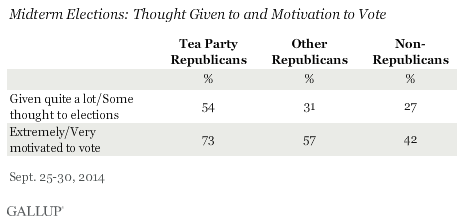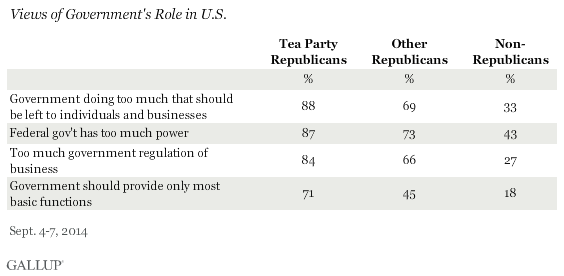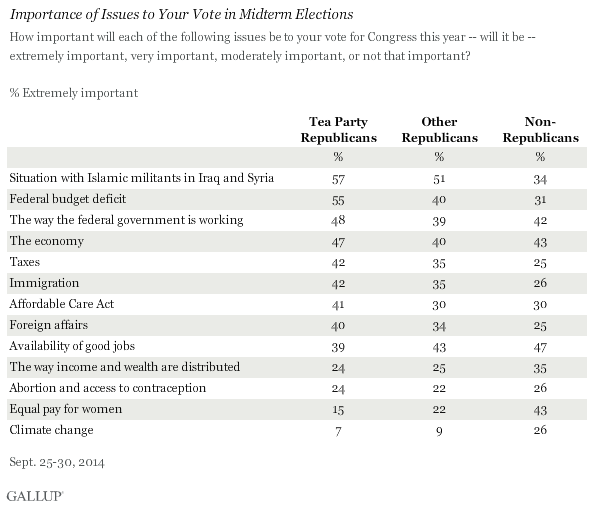Story Highlights
- 73% of Tea Party Republicans extremely/very motivated to vote
- Much more motivated than other Republicans, non-Republicans
- Tea Party Republicans most focused on deficit, Iraq and Syria
PRINCETON, N.J. -- Although the Tea Party has not been as visible in this year's midterm elections as it was in 2010, Tea Party Republicans have given more thought to this year's elections and are much more motivated to vote than are non-Tea Party Republicans or other Americans. About one in four Americans continue to say they support the Tea Party.

These results, from a Sept. 25-30 Gallup poll, demonstrate that despite what appears to be a lower profile this year, the Tea Party wing of the Republican Party -- about 18% of all national adults -- remains a powerful force, given their higher interest in the election and higher motivation to vote. This is not a new phenomenon; Republican Tea Party supporters gave the 2010 midterm elections more thought and were more motivated to vote than other Republicans, although all voters in general were paying more attention that year.
Previous Gallup research has shown that Tea Party Republicans are considerably more likely than other Republicans, as well as the rest of the population, to identify as conservatives. As befits this ideological orientation, Tea Party Republicans interviewed in a Sept. 4-7 survey were significantly more likely than other Republicans and the rest of the population to believe the government is doing too much, that there is too much government regulation of business and too much federal government power, and that government should be limited to providing only the most basic functions.

Tea Party Republicans also differ from other Republicans in the importance they place on a number of specific issues in terms of their midterm election vote. In particular, Tea Party Republicans are much more likely than other Republicans to say the federal budget deficit and the Affordable Care Act are "extremely important" to their vote, and they view a number of other issues as at least somewhat more important than do non-Tea Party-supporting Republicans. At the other end of the spectrum, Tea Party Republicans place somewhat less importance than other Republicans on equal pay for women and the availability of good jobs as issues.

Even with these differences, the top issues for Tea Party Republicans are generally the same as the top issues for other Republicans, except that Tea Party Republicans -- reflecting their overall higher levels of interest in the elections -- generally give the top issues at least a slightly higher importance rating.
More broadly, compared with all non-Republicans, Tea Party Republicans differ most in the importance they place on the deficit and the situation with the Islamic militants, and the lack of importance they place on equal pay for women.
Implications
During the 2010 midterm election campaign, the Tea Party had its greatest influence in the Republican primaries, pushing for and succeeding in nominating candidates who reflected its underlying ideology. This aspect of the Tea Party's influence has lessened in this election cycle, and the actual representation of Tea Party supporters in the general population has dropped slightly from 2010 levels. Still, although the Tea Party has been less visible in the election campaigning that has taken place this year in both the primaries and the lead-up to the general election, Tea Party supporters' stronger motivation to vote underscores the group's importance to the election outcome. Because most Tea Party supporters are Republicans or Republican leaners, and because it is unlikely that they will be voting for anyone other than a Republican candidate, the main effect of Tea Party supporters in the general election will be to provide a motivated base for the GOP to build on as it focuses on getting out the vote.
It is clear that Tea Party Republicans are defined by a strong belief in the need to curb the federal government's power and influence -- a belief that they are more likely than other Republicans to hold. This makes it logical that the two issues of importance to Tea Party Republicans on which they differ most compared with other Republicans are the federal budget deficit and the Affordable Care Act -- both of which are directly related to government spending and government power. It follows that the Tea Party's emphasis in future election years will likely continue to be nominating and electing candidates who embrace this "less government is better" mentality.
Survey Methods
Results for this Gallup poll are based on telephone interviews conducted Sept. 4-7, 2014, with a random sample of 1,017 adults, and telephone interviews conducted Sept. 25-30, 2014, with a random sample of 1,252 adults. Both samples were based on respondents 18 and older, living in all 50 U.S. states and the District of Columbia. For results based on the both samples of national adults, the margin of sampling error is ±4 percentage points at the 95% confidence level.
Each sample of national adults includes a minimum quota of 50% cellphone respondents and 50% landline respondents, with additional minimum quotas by time zone within region. Landline and cellular telephone numbers are selected using random-digit-dial methods.
Learn more about how the Gallup Poll Social Series works.

